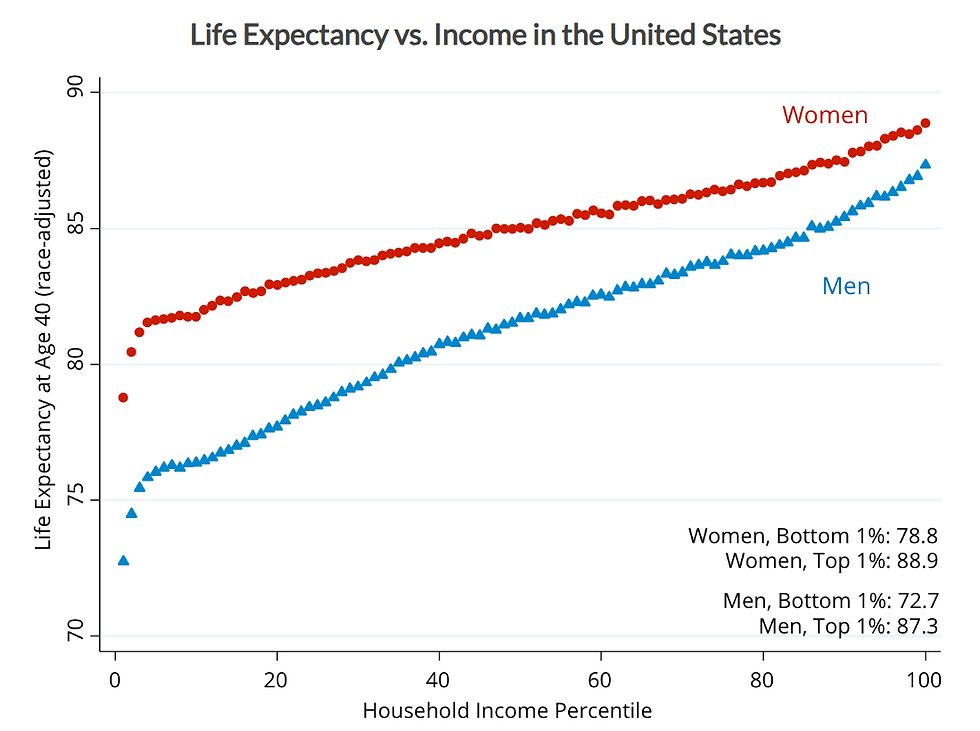Health-Wealth-Whealth?
- Stephanie Brooke Lennon
- Jan 28
- 3 min read
I'm fascinated by the interwoven influences of health and wealth. Here is a quick fly-by of just a few health-wealth chicken & egg effects.

Study after study shows that the two are inherently connected. Each predicts and promotes the other.
For example - healthier people have more ability to learn and retain what they pick up in school. They have better energy and do better early in life - which carries through to later in life. Better learning -> earning better grades -> getting into a good school -> getting hired into a better job -> higher advancement and earning potential ... whether you're working for yourself or somebody else. They can focus better and let their creativity shine as they tackle and solve more advanced and interesting problems.
Conversely, sickly individuals miss class and take more time off work. When they're not feeling well, it's hard to tackle and overcome new challenges. When they're not present, others are chosen for the next opportunity to shine. Out of sight is out of mind - but even when on someone's mind, there may be doubt about their availability to see the project through to completion. Advancement will be limited when the big opportunities go to other people, or when they're struggling to excel in their current role.
On the other hand, wealthier people tend to be healthier - even when equal healthcare insurance is available. The more affluent are more likely to seek proactive care and medical attention when they're not feeling well. Their jobs tend to be more forgiving for taking time off work to take themselves or their loved ones to the doctor - or to stay home in bed for a day or two if necessary. Transportation to get to the doctor's office is less of a challenge.
Financially, for people with means, while still annoying, the $30-90 copay doesn't represent a tradeoff vs. buying groceries or filling the tank with gas. Paying for prescriptions is less prohibitive, and joining a gym or fitness studio can be woven into the budget.
Another common explanation is that of food quality (and it's not incorrect). Poorer communities often have less access to full grocery stores. Termed "food deserts," many families rely on convenience stores for food shopping... unfortunately, stocked with highly processed, packaged goods with limited to no fresh produce available. Family budgets cannot accommodate Instacart or other premium grocery delivery services.
Above and beyond access to fresh produce and meats, wealthier families can afford and choose a wide variety of organic, locally sourced options which typically come at higher price points. The quality of what one eats has a direct impact on health markers across the board, immediately and connected to long-term diseases.
Ultimately the two (health and wealth) manifest in a startling combined effect. The wealthiest 1% live 10 (women) to 14.5 (men) years longer than the poorest 1% of Americans.

We'll explore more in future posts, but if you can help your kids (and yourself) live longer and healthier lives by better managing your finances ... and live a wealthier, more comfortable life by managing your health - shouldn't and wouldn't you?
Not sure how to introduce money concepts to your children? Check out this online course: Raising Wealthy Kids
Stephanie Brooke Lennon is the author of Family Bank Blueprint, GoldQuest, and What Would Water Do? Simple Strategies for Navigating Life's Obstacles. Her titles are available in Paperback and Kindle on Amazon.com. Follow Stephanie Brooke on Facebook, Instagram, TikTok, YouTube, Twitter, Amazon, and at BrookeLennon.com.







Comments